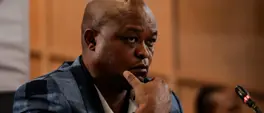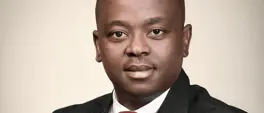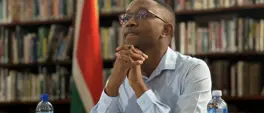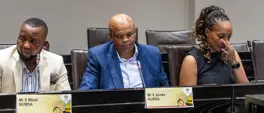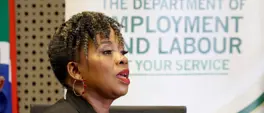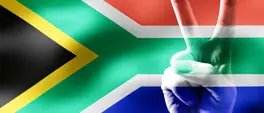CHARLES MATSEKE | The R1 Trillion myth: When Populism and media performance replace journalism
Charles Matseke
28 October 2025 | 14:19"The real story is not that R1 trillion benefited 100 people. It is that a democracy of 60 million has been persuaded to believe it without proof."

The DA launched a new billboard on the N1 criticising B-BBEE as enriching ANC elites while leaving South Africans poor. Photo: Thabiso Goba
The South African media landscape has entered an era where outrage substitutes for investigation, and an analyst’s reflections become the foundation for national “fact.”
When an opinion is repeated enough, it solidifies into collective truth. We saw this again with the Democratic Alliance’s claim that “R1 trillion in Broad-Based Black Economic Empowerment (BBBEE) deals has benefited only 100 people.”
No public dataset, no methodological transparency just an arresting number and a moral hook. The media, predictably, took the bait.
This phenomenon is not new. As I’ve noted in my opinions, including in South Africa’s quiet privatisation and the birth of an oligopoly, our public sphere has been drifting toward a state where truth is not discovered but manufactured.
Headlines like “Analysts Warn”, “Experts Caution”, or “South Africans Told” dominate our news cycles a linguistic choreography that presents conjecture as fact. The result is an illusion of knowledge: audiences believe they are informed while being carefully managed toward predetermined conclusions.
In Demagogues, Populism and Misinformation (2025) Brown and Handscomb describe how populism thrives in “information-saturated but knowledge-poor” environments spaces where emotion displaces analysis, and repetition creates reality.
South Africa fits this pattern precisely. Political elites on all sides weaponise public disillusionment and the media amplifies those weapons under the guise of balance.
The DA’s BEE claim illustrates this dynamic. By invoking “100 people,” the party positions itself as championing ordinary citizens against the corrupt elite, presenting the statistic as moral evidence.
Yet, as the book warns, populist rhetoric doesn’t need to be true, it only needs to feel true. The number 100 is not data; it is a metaphor engineered for outrage.
Misinformation here is not the random by-product of error; it is the deliberate shaping of affect. Each headline, sound-bite, and tweet contributes to what the authors call the “affective economy of misinformation”, where feeling replaces fact and journalism becomes the stage for demagogic performance.
In Authoritarian Populism and the Challenges for News Journalism by Ekström and Patrona (2024), they argue that under authoritarian populism, discourse itself becomes the battleground. Journalism is constrained not just by political pressure but by its own performative habits, what they term the “dramaturgy of outrage.”
The journalist no longer merely reports; they stage moral theatre.
This description could easily apply to South Africa’s media today. Instead of interrogating power, many journalists choreograph it adopting the language of reform, echoing elite talking points, and packaging dissent as “radical.”
The boundaries of legitimate debate are quietly policed: critics of government policy are labelled “populist disruptors,” while party spokespeople casually moralise without scrutiny.
It is in this environment that the DA’s “R1 trillion” narrative thrives. By presenting a quote from a respected academic (William Gumede of the Wits School of Governance) as verified data, the party and its media allies exploit journalism’s structural weakness: its dependence on authority, speed, and spectacle.
Ekström & Patrona warn that when journalists become “performers in the populist theatre,” the line between informing and indoctrinating collapses.
Drawing on the analysis of Chomsky and Herman in Manufacturing Consent, elite democracies maintain control not through censorship, but through selective emphasis.
The DA’s claim, amplified by uncritical media, shifts public focus from structural inequality to moral blame. “Look at the greedy few,” is the message as if the problem lies in the character of individuals rather than the architecture of the economy.
This creates collective guilt: ordinary South Africans are invited to despise “the 100” while ignoring the system that made them possible. It is a narrative sleight-of-hand that benefits both corporate capital and political elites, who appear reformist without challenging the economic structure they share.
The crisis of journalism is therefore not only ethical but structural. When media houses rely on advertising revenue from conglomerates that also fund political parties, editorial independence becomes aspirational. When newsroom logic rewards clicks over verification, misinformation becomes profitable.
The piece I published on the alleged impunity in the Katiso “KT” Molefe case (How the Katiso Molefe case exposes South Africa’s descent into elite impunity) illustrates the consequences: state-syndicate collusion, media silence, and narrative control.
A journalist recently accused of bias and agenda-driven reporting is only the tip of an iceberg of structural editorial capture. The problem is systemic: a press culture where performance trumps precision and where truth is subordinated to narrative flow. The tragedy is that this happens in a country that desperately needs a courageous press to confront the fusion of state and capital that defines its politics.
To recover journalism’s democratic purpose, three shifts are essential:
• Transparency over authority. If parties or analysts make statistical claims, they must publish their sources. The media must treat unsourced figures as opinion, not fact.
• Depth over speed. Verification must trump virality. Newsrooms should invest in data literacy, investigative partnerships, and open-source verification.
• Courage over consensus. The press must rediscover adversarial journalism, the kind that questions the comfortable rather than comforting the powerful.
The stakes could not be higher. As South Africa moves toward the 2026 and 2029 elections, the convergence of populism, misinformation and elite media capture threatens to hollow out the public sphere itself. If left unchallenged, the country risks replacing critical debate with managed hysteria. A democracy of slogans rather than substance.
The task of journalists, academics, and citizens alike is to break this cycle. The truth must once again become the order of the day, not the residue of yesterday’s headline.
Until then, the real story is not that R1 trillion benefited 100 people. It is that a democracy of 60 million has been persuaded to believe it without proof.
Charles Matseke (MPhil in Politics and International Relations) is a researcher and writer with a keen interest in contemporary political dynamics. His research focuses on electoral politics, foreign policy analysis, and international relations, with a particular emphasis on the Global South and Africa's role in global affairs.
Get the whole picture 💡
Take a look at the topic timeline for all related articles.


